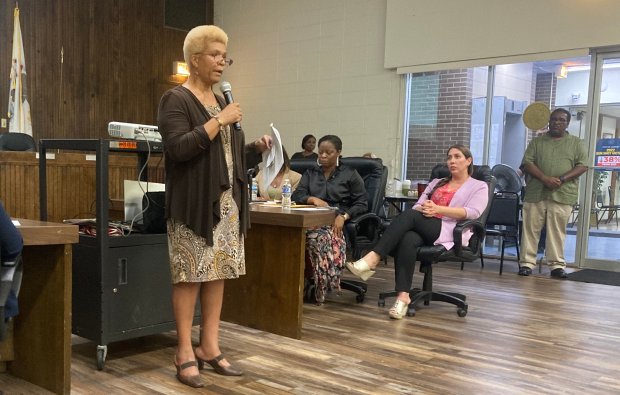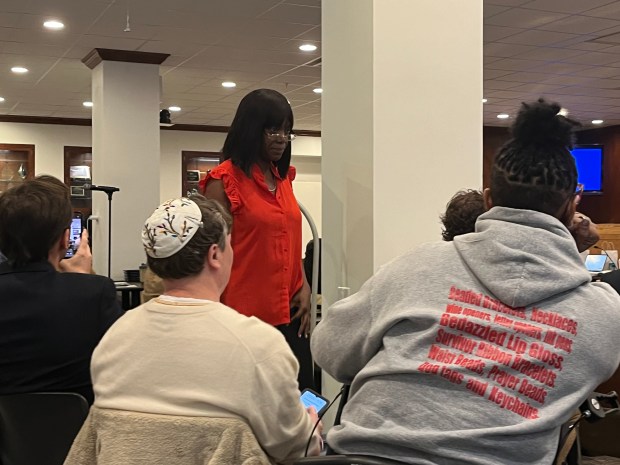A month after Harvey residents living in 15 homes in the vicinity of 153rd Street and Myrtle Avenue were supposed to vacate their homes to make way for a flood control project, an extended family remains and continues to oppose the project.
Carlita Poole-Tingle lives with her two children next door to her 89-year-old father, Joe Poole, and her sister Lenora Poole and her children. Joe Poole purchased the two homes 52 years ago and had no intention of moving until they were notified in July 2023 of a plan by the city in conjunction with the Cook County Metropolitan Water Reclamation District to carve out a stormwater detention basin in their neighborhood.
“We have never been in favor of this,” Poole-Tingle said.
The Central Park Stormwater Detention Basin project aims to reduce flooding and protect 209 buildings in Harvey, with an estimated cost of about $9.8 million, according to the MWRD. The project also involves installing nearly 2 miles of storm sewers and 4.4 acres of open green space where the city plans to build a park.
But while some residents rallied behind Poole-Tingle’s family in opposing the project, she said her elderly neighbors are reluctant to fight any longer.
“It’s hard fighting,” she said. “It’s a mental drain.”
Poole-Tingle said residents were initially told to move out by this past summer to allow construction on the basin to begin. Now, she is uncertain when a new move-out date will be set and whether her family will have enough time to pack or sell their belongings.
In May, the MWRD offered residents a purchase price for their homes. While many accepted the deal and are working with a relocation specialist from MWRD to find new housing, Poole-Tingle said her family is still in negotiations because the price is insufficient to cover the costs of finding new homes — especially since her father still has an outstanding mortgage.
Poole-Tingle said her father is waiting for a counteroffer from the MWRD, but he still likely won’t be able to afford a home of comparable value to his current residence, which she said is significantly larger than most in the area.
“With the amount they gave, he won’t be able to get that same home,” she said. “With six bedrooms, two fireplaces, he wouldn’t be able to afford it. It’s not comparable.”
A group of Harvey residents showed up to support Poole-Tingle and her family at a MWRD board meeting Thursday, where officials approved the purchase of another resident’s home on Myrtle Avenue for $144,500, along with up to $15,000 for relocation and move-out costs. Poole-Tingle wasn’t able to take off work to join them at the meeting to voice their ongoing concerns about the project.
Harvey resident Sharron McGee told board members her concerns not only about the forced relocation of residents but also about the safety risks posed by the project’s proximity to a grade school just a few blocks away.
“The city of Harvey has a track record of not taking care of things,” she said. “So I can see that retention pond dilapidating over the years, nobody taking care of it. I can see it becoming unsafe for our children. I live in Harvey so I can tell you firsthand that retention pond there is just not a good idea.”
McGee and other speakers argued that Harvey residents were not consulted about the project, learning of its details only at a city meeting, despite the MWRD having planned it since 2018.
MWRD board President Kari Steele, who is up for reelection Nov. 5, said negotiations on purchasing properties have gone smoothly up to this point.
“The Board of Commissioners have been in constant contact with our relocation specialists and with the elected officials in the city of Harvey,” Steele said. “The families that have agreed to relocate are positive, and they are not complaining.”
The project site consists of 31 properties, of which 16 are vacant and will be acquired through eminent domain, while 15 contain residential buildings, according to the MWRD.
A year ago, hundreds of Harvey residents signed a petition in an effort to block the flood control project because it would uproot some homeowners, and demanded the MWRD look at alternative locations for the basin.
Kim Polk, a relocation specialist with the Metropolitan Water Reclamation District, explains to residents how the district will help those displaced find and afford comparable housing during a 2023 MWRD presentation in Harvey. (Brett Johnson/Daily Southtown)
Poole-Tingle said her family has consistently voiced their opposition to the project. While relocation efforts may appear positive, she believes residents have ultimately resigned themselves to accepting the deal and moving.
At Thursday’s board meeting, Steele said she has spoken with Harvey families facing relocation, and “No one has expressed that they are unhappy. They are excited about the project.”
“They are happy that finally, Harvey is seeing the environmental justice that they deserve,” Steele added. “For far too long, communities like Harvey have been overlooked from stormwater management projects because of, we’ll just say, their financial situation.”
Other commissioners said the district did its due diligence in researching the project and finding ways to compensate residents for their homes.
“I take offense of saying that the staff who work at the district, that they want to oust people from their homes, and I think that is a false pretense,” said Commissioner Precious Brady-Davis.
Board members also reiterated the project will solve an issue in the Harvey community that has long burdened residents in the larger community.
“I very much view flooding as a matter of environmental justice, so much so that we coined our own term in our office called flood justice. When flooding occurs, it becomes a public health problem,” said Commissioner Cameron Davis, chair of the MWRD’s stormwater management committee. “Nobody wishes that a resident should be forced from their home — that’s not how we operate. That’s not what we do.”
According to an MWRD impact statement published in August, the agency looked at alternative locations for the project that wouldn’t displace residents, such as the former Dixie Square Mall along Dixie Highway and the now-demolished Lowell-Longfellow School site on Lexington Avenue.
However, MWRD engineers concluded that the basin must be located near Myrtle Avenue between 153rd and 154th Streets because it’s a low-lying area that will enable gravity to move stormwater into the Wood Street sewer system.
At a Sept. 7, 2023 city council meeting in Harvey, residents were told the project, funded through FEMA’s Building Resilient Infrastructure and Communities grant program, had already received approval for its site plans, and any changes to the plans could affect the funding.
That provided little solace to those who don’t want to move from their family’s longtime home.
“It’s sad and it’s hurtful, because you lived here all your life,” Poole-Tingle said. “It comes off like, you’ll get another house, they’ll pay you, but they’re not going to give you the true value of your home.”
smoilanen@chicagotribune.com




